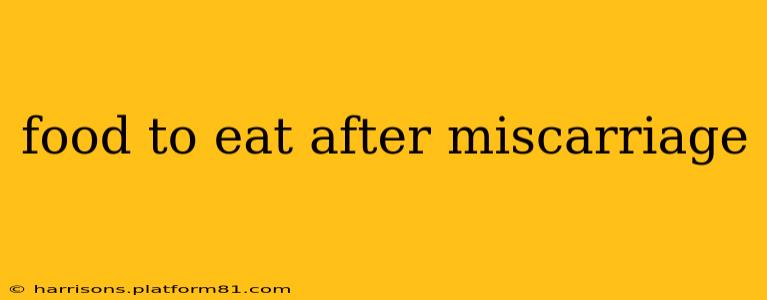Experiencing a miscarriage is incredibly difficult, both emotionally and physically. Your body has undergone significant changes, and nourishing it with the right foods is crucial for recovery. While there's no magic diet to erase the pain, focusing on nutrient-rich foods can support your physical healing and overall well-being. This guide explores the best foods to eat after a miscarriage, addressing common questions and concerns.
What should I eat after a miscarriage?
The best foods after a miscarriage focus on providing easily digestible nutrients vital for recovery. Prioritize foods that are gentle on your stomach, packed with essential vitamins and minerals, and offer sustained energy. Think lean protein, whole grains, plenty of fruits and vegetables, and healthy fats. Avoid overly processed foods, excessive sugar, and caffeine, which can exacerbate fatigue and digestive upset.
Prioritizing Protein for Repair and Recovery
Protein is essential for tissue repair and rebuilding after the physical demands of miscarriage. Good sources include:
- Lean meats: Chicken breast, turkey, and fish (salmon, tuna) are excellent choices.
- Eggs: A convenient and protein-rich option.
- Legumes: Lentils, beans, and chickpeas provide protein and fiber.
- Greek yogurt: High in protein and probiotics, which support gut health.
The Importance of Iron for Blood Loss
Miscarriage can lead to blood loss, making iron replenishment crucial. Incorporate iron-rich foods like:
- Red meat: A good source of heme iron, which is more easily absorbed than non-heme iron.
- Leafy green vegetables: Spinach, kale, and collard greens are excellent sources of non-heme iron. Pair them with vitamin C-rich foods to enhance absorption.
- Iron-fortified cereals: Check labels for iron content.
Fiber for Gentle Digestion
Gentle digestion is key after a miscarriage. Fiber-rich foods help regulate bowel movements and prevent constipation:
- Whole grains: Oats, brown rice, and quinoa are good choices.
- Fruits and vegetables: Berries, apples, bananas, broccoli, and sweet potatoes are excellent sources of fiber.
What foods should I avoid after a miscarriage?
During your recovery, it's wise to limit or avoid certain foods that may negatively impact your digestive system or overall well-being:
- Highly processed foods: These often lack nutrients and can cause digestive upset.
- Excessive sugar: While you might crave sugary foods for comfort, they offer little nutritional value and can lead to energy crashes.
- Caffeine: Caffeine can increase anxiety and interfere with sleep, already challenged after a miscarriage.
- Alcohol: Alcohol should be avoided completely during your recovery.
Is it okay to eat comfort foods after a miscarriage?
While indulging in a small amount of comfort food occasionally might provide temporary solace, it shouldn’t be your primary source of nutrition. Remember, nourishing your body with nutrient-rich foods is crucial for physical and emotional recovery.
What are some easy recipes for after a miscarriage?
Simple, nutritious meals are ideal during this time. Consider easy-to-digest options like soups, stews, smoothies, and omelets. Focus on incorporating the nutrient-rich foods mentioned above. Don't feel pressured to cook elaborate meals; prioritize what feels manageable and nourishing.
How long does it take to recover physically after a miscarriage?
Physical recovery varies from person to person. It can take several weeks or even months for your body to fully heal. Listen to your body, rest when needed, and prioritize nutritious eating to support the recovery process.
When should I see a doctor after a miscarriage?
If you experience heavy bleeding, severe pain, fever, or any other concerning symptoms, seek medical attention immediately. Your doctor can provide guidance and support throughout your recovery. Regular check-ups are also essential to monitor your physical and mental health.
Remember, every woman's experience is unique. This information is for general guidance, and it's essential to consult your healthcare provider for personalized advice and support tailored to your individual needs after a miscarriage. Prioritizing self-care, including nourishing your body with healthy foods, is a crucial step in your healing journey.
